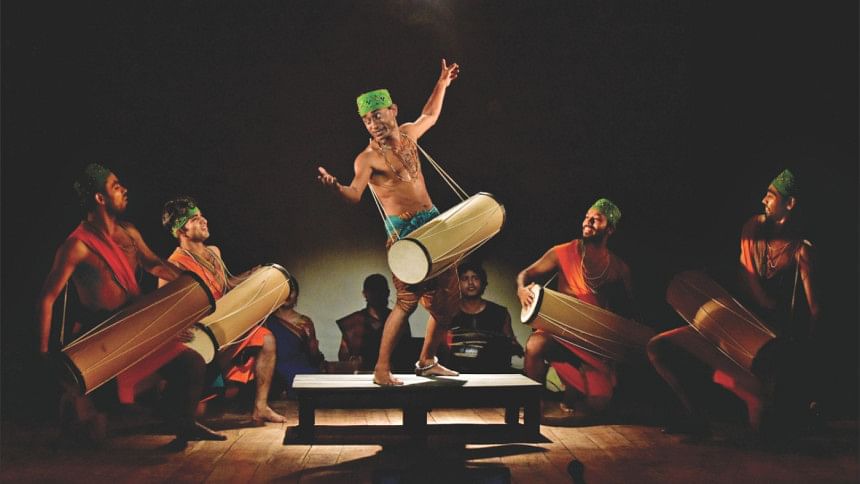Back to the wilderness, take away the town

About ninety years ago, Rabindranath Tagore felt apprehensive about the rise of materialistic approaches in our so-called civilised society and expressed his uneasiness in at least three, if not more, of his literary works: "Raktokarabi", a play; "Sabhyatar Sankot", an essay; and "Sabhyatar Prati", a poem.
"Maatbring" is another theatrical addition to that persisting anxiety, in line with "Bon Pangshul" by Selim Al-Deen, "Rarang" by Mamunur Rashid or "Droupodi", a Monipuri play by recently-expired Thespian Oja Heisnam Kanhaila, although aesthetically more straightforward and less substantiating than the other two with themes like love and back to the wilderness, take away the town.
The play begins in a festive mood as the Mandi men and women enter the stage with brightly-coloured placards carved with designs of the flora and fauna of their dwelling immediately creating a befitting ambiance, if not unique, for the narrative.
To quote Tagore once again, 'Trees are the earth's endless effort to speak to the listening heaven'-- the play has a similar maxim revolving around Tatararabuga, the creator of Garos who dreams of 'founding an enlightened world that will have the sun and the moon after the colour of his eyes and his holy attire will spill all heavenly seeds on the barren earth to sprout countless trees and plants'. But unfortunately, writer Sanwar Alam Khan Dulu has not been able to incorporate this exhortation.
As for Jahidul Islam Jaduin, the role of Kanu is quite articulate and acts with unbridled passion. The same goes with Tanjila Akter Jini, the lead female role of Mitti. I even think she has in many ways surpassed her counterpart Jahidul Islam.
Adity Sarkar Ruma, enacting Kolaboti Sangma, had the potential to be one of the core controlling characters of the plot but unfortunately was not given space to amplify her role.
In a tribal community, which is essentially matrilineal, the place of a personality like Kolaboti has a forceful projective importance. More so because ours is a patrilineal society where male egos dominate. Her torching death at the last scene could have created a meaningful and far-reaching impact.
Susimi, played by Afsana Beauty, is fluent and eloquent in her discourses most of the time but her expressions more often than not fail to match with her dialogue projections.
Both the playwright and the director have mentioned in their notes that "Maatbring" is a Garo vocabulary originating from A'chick language meaning 'tribes who live in deep forest.' Albeit the appropriate usage of the term, study shows this particular dialect is not spoken by the Garos of Bangladesh.
Noticeably enough, all the dialogues and songs are in 'promito' Bangla without the tribal touch.
Sadhana is one of those few female playwrights who has achieved considerable success in our theatre world and definitely has displayed her quality and flair in "Maatbring". She possesses an intrinsic potent force for going a long way.
The off-Dhaka troupe, Bibartan Jessore, brought the wonderful production at the 19-day long National Theatre Festival 2016, arranged by Shilpakala Academy, and Bangladesh Group Theatre Federation, and sponsored by the Culture Ministry, People's Republic of Bangladesh, evidencing that with right guidance and patronage, the road to aesthetics can be traversed smoothly.
The writer is Professor, Department of English, NSU.

 For all latest news, follow The Daily Star's Google News channel.
For all latest news, follow The Daily Star's Google News channel. 



Comments